1 of 20 If a diode measures a high resistance in both direct
1 of 20
If a diode measures a high resistance in both directions, the diode is
leaky
good
shorted
open
Question
2 of 20
If the bulk resistance is zero, the graph above the knee becomes
tilted at an angle of about 30°
horizontal
vertical
none of the above
3 of 20
An ideal diode should have zero or no resistance
at all time
for either forward or reverse bias
when forward-biased and infinite resistance when reverse-biased
when reverse-biased and infinite resistance when forward-biased
4 of 20
The third approximation of a diode is usually used when
the load resistance is low
the source voltage is very high
troubleshooting
all of the above
Question
5 of 20
The 1N4001 to 1N4007 series of diodes has a maximum forward current rating of
1 A
30 A
100 A
150 mA
6 of 20
The input voltage applied to a voltage tripler is 120 Vrms. What is the ideal dc output voltage?
509 V
360 V
170 V
56.56 V
The dc current flowing through the diode in a half-wave rectifier equals
twice the dc load current
half the dc load current
the dc load current
one-fourth the dc load current
The dc current through each diode in a bridge rectifier equals
twice the dc load current
half the dc load current
the load current
one-forth the dc load current
A half-wave rectifier has a dc load current of 50 mA and a filter capacitance of 470 F. The peak-to-peak ripple voltage equals
17.7 Vp-p
3.6 Vp-p
1.77 Vp-p
0.886 Vp-p
For forward-biased diodes, the voltage where the current increases rapidly is called the
knee voltage
breakdown voltage
zener voltage
turn-off voltage
A step-up transformer has a turns ratio of 1:2.5. If the primary voltage is 115 Vrms ,the secondary voltage is
46 Vrms
65 Vrms
287.5 Vrms
345 Vrms
12 of 20
The diode in a half-wave rectifier with a capacitor-input filter will have a peak-inverse-voltage (PIV) equal to
½ Vp
Vp
2Vp
4Vp
13 of 20
The breakdown voltage of a diode
equals the knee voltage
is the voltage where the diode stops conducting
is usually less then 1 volt
is the reverse voltage where avalanche occurs
14 of 20
Only a small current exists in a
forward-biased diode
shorted diode
reverse-biased diode
none of the above
15 of 20
For a diode the
P side is called the cathode and the N side is called the anode
P side is called the anode and the N side is called the cathode
P side is called the emitter and the N side is called the collector
current can flow both ways
Question
16 of 20
Small signal diodes should be tested on ranges greater than R x 10 because
some ohmmeters can produce enough current on low ranges to destroy the diode being tested
accuracy is poor on the lower ranges
the ohmmeter cannot forward-bias the diode being tested when it is on the lower ranges
the breakdown voltage rating may be exceeded
Question
17 of 20
When using up-down analysis
a calculator must be used
do not use a calculator
make exact circuit calculations for all possible troubles
be exact
18 of 20
The phasing dots on transformers indicate which
two leads have the same instantaneous phase
leads are 180° out of phase
lead is always negative
none of the above
19 of 20
The frequency of the line voltage used in the United States is
1 kHz
50 Hz
60 Hz
120 Hz
Question
20 of 20
In power supplies, slow-blow fuses are normally used to
protect against surge current
protect against the average current
protect against load current surges
none of the above
1 of 20
If a diode measures a high resistance in both directions, the diode is
leaky
good
shorted
open
Question
2 of 20
If the bulk resistance is zero, the graph above the knee becomes
tilted at an angle of about 30°
horizontal
vertical
none of the above
3 of 20
An ideal diode should have zero or no resistance
at all time
for either forward or reverse bias
when forward-biased and infinite resistance when reverse-biased
when reverse-biased and infinite resistance when forward-biased
4 of 20
The third approximation of a diode is usually used when
the load resistance is low
the source voltage is very high
troubleshooting
all of the above
Question
5 of 20
The 1N4001 to 1N4007 series of diodes has a maximum forward current rating of
1 A
30 A
100 A
150 mA
6 of 20
The input voltage applied to a voltage tripler is 120 Vrms. What is the ideal dc output voltage?
509 V
360 V
170 V
56.56 V
The dc current flowing through the diode in a half-wave rectifier equals
twice the dc load current
half the dc load current
the dc load current
one-fourth the dc load current
The dc current through each diode in a bridge rectifier equals
twice the dc load current
half the dc load current
the load current
one-forth the dc load current
A half-wave rectifier has a dc load current of 50 mA and a filter capacitance of 470 F. The peak-to-peak ripple voltage equals
17.7 Vp-p
3.6 Vp-p
1.77 Vp-p
0.886 Vp-p
For forward-biased diodes, the voltage where the current increases rapidly is called the
knee voltage
breakdown voltage
zener voltage
turn-off voltage
A step-up transformer has a turns ratio of 1:2.5. If the primary voltage is 115 Vrms ,the secondary voltage is
46 Vrms
65 Vrms
287.5 Vrms
345 Vrms
12 of 20
The diode in a half-wave rectifier with a capacitor-input filter will have a peak-inverse-voltage (PIV) equal to
½ Vp
Vp
2Vp
4Vp
13 of 20
The breakdown voltage of a diode
equals the knee voltage
is the voltage where the diode stops conducting
is usually less then 1 volt
is the reverse voltage where avalanche occurs
14 of 20
Only a small current exists in a
forward-biased diode
shorted diode
reverse-biased diode
none of the above
15 of 20
For a diode the
P side is called the cathode and the N side is called the anode
P side is called the anode and the N side is called the cathode
P side is called the emitter and the N side is called the collector
current can flow both ways
Question
16 of 20
Small signal diodes should be tested on ranges greater than R x 10 because
some ohmmeters can produce enough current on low ranges to destroy the diode being tested
accuracy is poor on the lower ranges
the ohmmeter cannot forward-bias the diode being tested when it is on the lower ranges
the breakdown voltage rating may be exceeded
Question
17 of 20
When using up-down analysis
a calculator must be used
do not use a calculator
make exact circuit calculations for all possible troubles
be exact
18 of 20
The phasing dots on transformers indicate which
two leads have the same instantaneous phase
leads are 180° out of phase
lead is always negative
none of the above
19 of 20
The frequency of the line voltage used in the United States is
1 kHz
50 Hz
60 Hz
120 Hz
Question
20 of 20
In power supplies, slow-blow fuses are normally used to
protect against surge current
protect against the average current
protect against load current surges
none of the above
1 of 20 If a diode measures a high resistance in both directions, the diode is leaky good shorted open Question 2 of 20 If the bulk resistance is zero, the graph above the knee becomes tilted at an angle of about 30° horizontal vertical none of the above 3 of 20 An ideal diode should have zero or no resistance at all time for either forward or reverse bias when forward-biased and infinite resistance when reverse-biased when reverse-biased and infinite resistance when forward-biased 4 of 20 The third approximation of a diode is usually used when the load resistance is low the source voltage is very high troubleshooting all of the above Question 5 of 20 The 1N4001 to 1N4007 series of diodes has a maximum forward current rating of 1 A 30 A 100 A 150 mA 6 of 20 The input voltage applied to a voltage tripler is 120 Vrms. What is the ideal dc output voltage? 509 V 360 V 170 V 56.56 V The dc current flowing through the diode in a half-wave rectifier equals twice the dc load current half the dc load current the dc load current one-fourth the dc load current The dc current through each diode in a bridge rectifier equals twice the dc load current half the dc load current the load current one-forth the dc load current A half-wave rectifier has a dc load current of 50 mA and a filter capacitance of 470 F. The peak-to-peak ripple voltage equals 17.7 Vp-p 3.6 Vp-p 1.77 Vp-p 0.886 Vp-p For forward-biased diodes, the voltage where the current increases rapidly is called the knee voltage breakdown voltage zener voltage turn-off voltage A step-up transformer has a turns ratio of 1:2.5. If the primary voltage is 115 Vrms ,the secondary voltage is 46 Vrms 65 Vrms 287.5 Vrms 345 Vrms 12 of 20 The diode in a half-wave rectifier with a capacitor-input filter will have a peak-inverse-voltage (PIV) equal to ½ Vp Vp 2Vp 4Vp 13 of 20 The breakdown voltage of a diode equals the knee voltage is the voltage where the diode stops conducting is usually less then 1 volt is the reverse voltage where avalanche occurs 14 of 20 Only a small current exists in a forward-biased diode shorted diode reverse-biased diode none of the above 15 of 20 For a diode the P side is called the cathode and the N side is called the anode P side is called the anode and the N side is called the cathode P side is called the emitter and the N side is called the collector current can flow both ways Question 16 of 20 Small signal diodes should be tested on ranges greater than R x 10 because some ohmmeters can produce enough current on low ranges to destroy the diode being tested accuracy is poor on the lower ranges the ohmmeter cannot forward-bias the diode being tested when it is on the lower ranges the breakdown voltage rating may be exceeded Question 17 of 20 When using up-down analysis a calculator must be used do not use a calculator make exact circuit calculations for all possible troubles be exact 18 of 20 The phasing dots on transformers indicate which two leads have the same instantaneous phase leads are 180° out of phase lead is always negative none of the above 19 of 20 The frequency of the line voltage used in the United States is 1 kHz 50 Hz 60 Hz 120 Hz Question 20 of 20 In power supplies, slow-blow fuses are normally used to protect against surge current protect against the average current protect against load current surges none of the above
| leaky | |
| good | |
| shorted | |
| open |
Solution
Ans(1.) Open, the diode is good if it shows high resistance only in one direction but high resistance for both direction it is open.
Ans(2.) Vertical, because of zero bulk resistance graph increases ideally or vertically.
Ans(3.) when forward-biased and infinite resistance when reverse-biased, because ideal diode becomes open in farward biase and open in reverse biased.
Ans(4.) the load resistance is low,Semiconductor material has some resistance, which will be incorporated in the Third Model. This resistance (rf) is relatively small and ranges from a few ohms to several hundred ohms.
Ans(5.) 30A, diodes of these series have low farward voltage drop and surge over load rating about 30A.
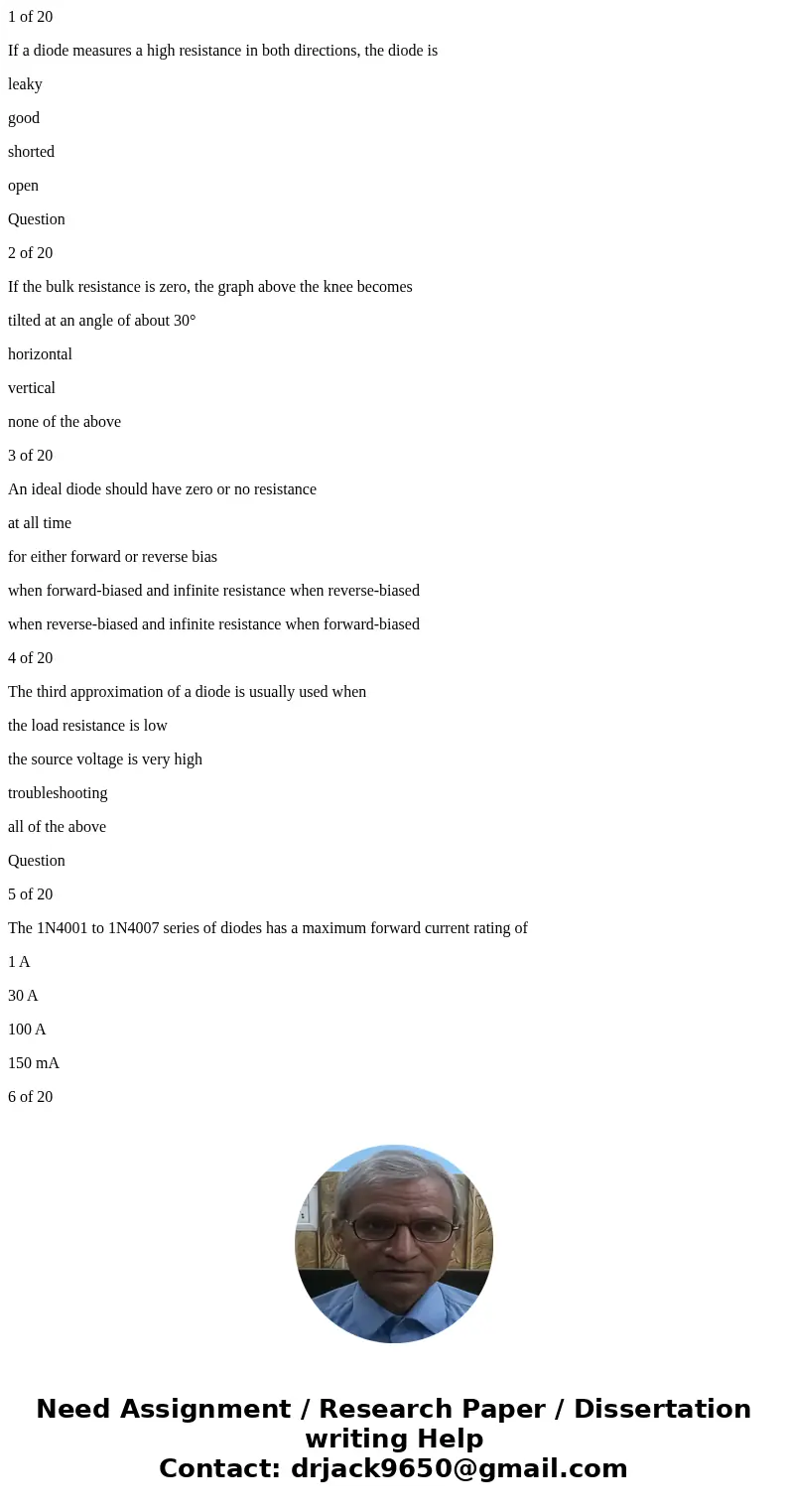
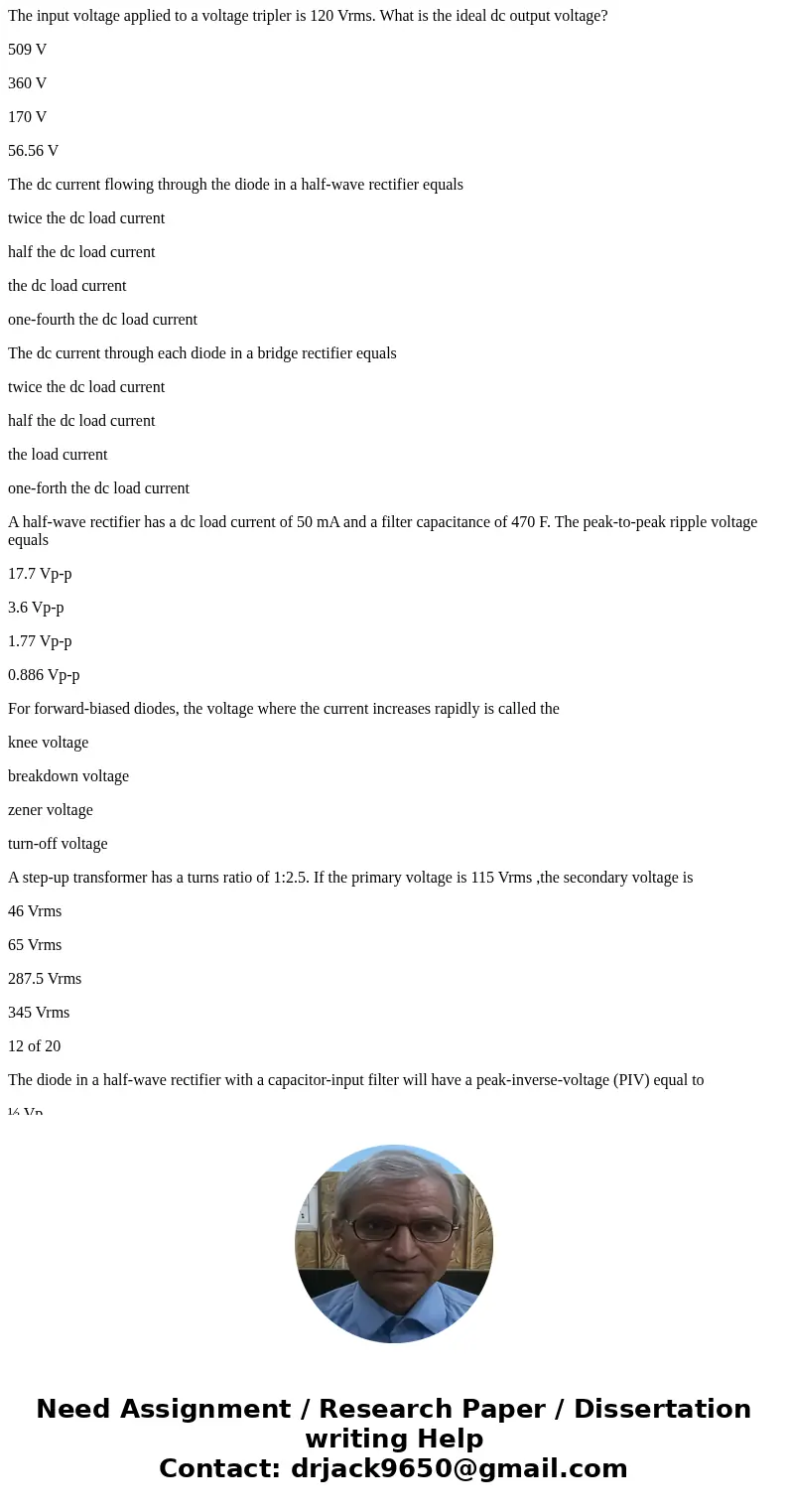
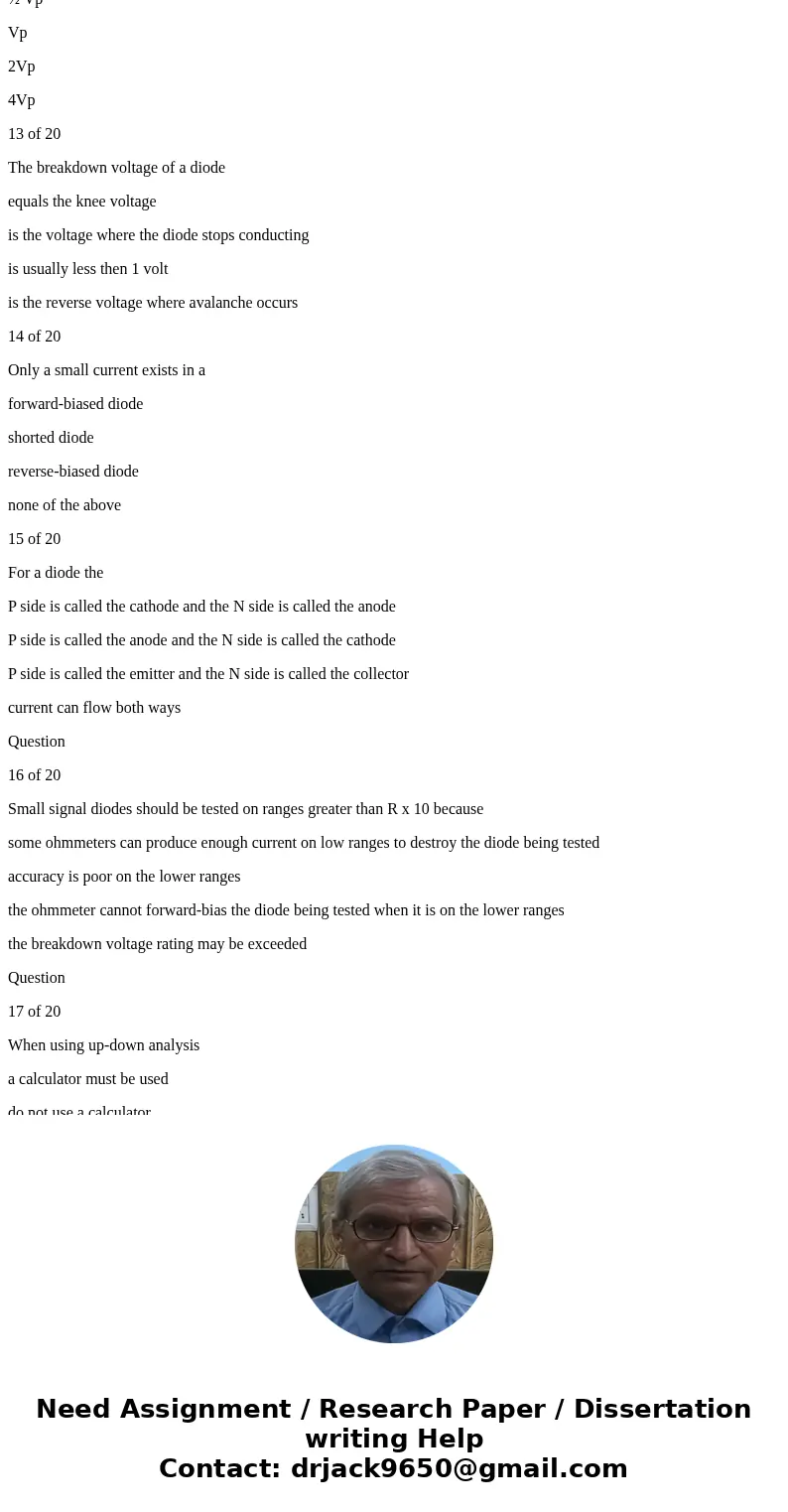
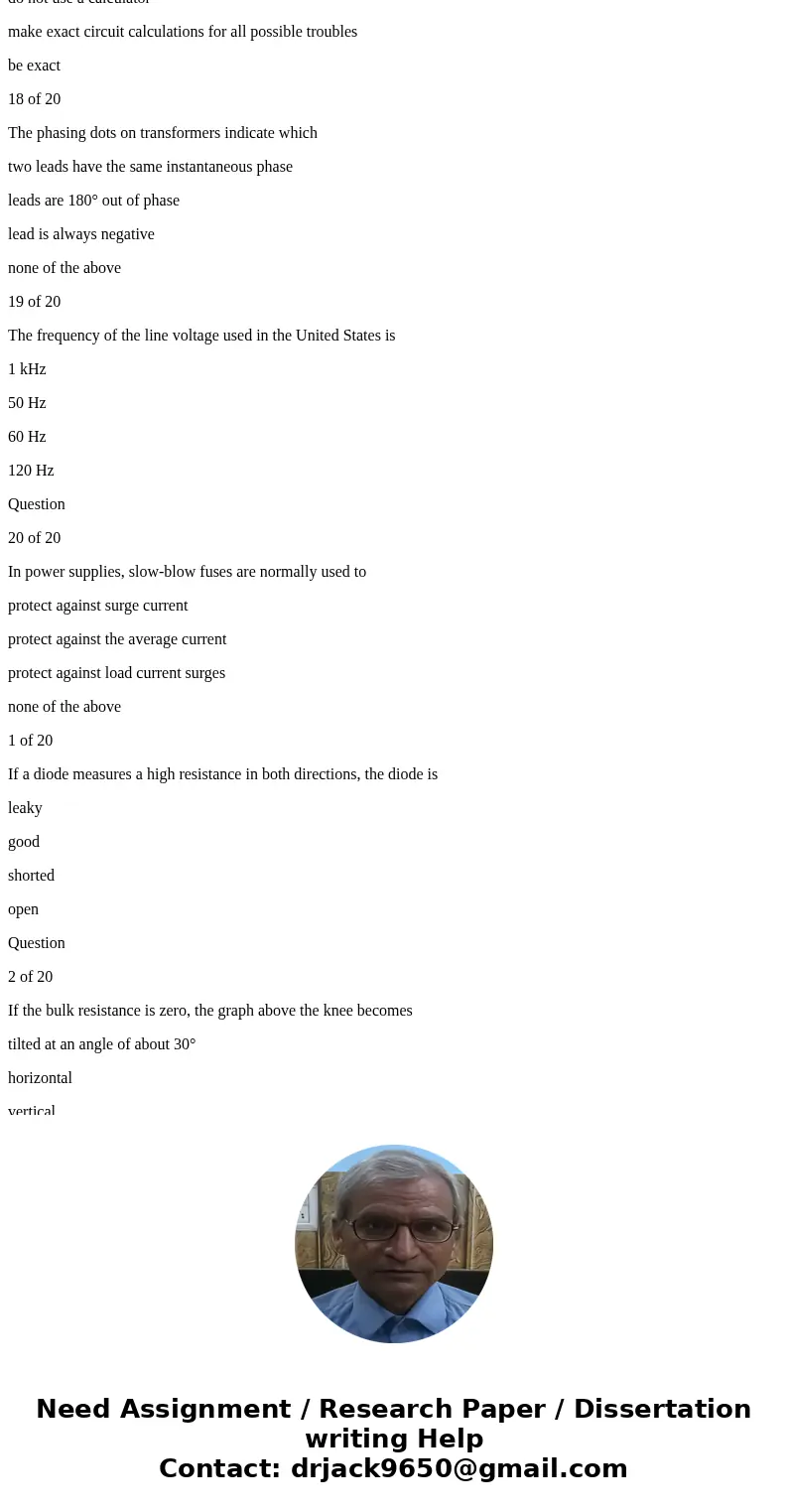
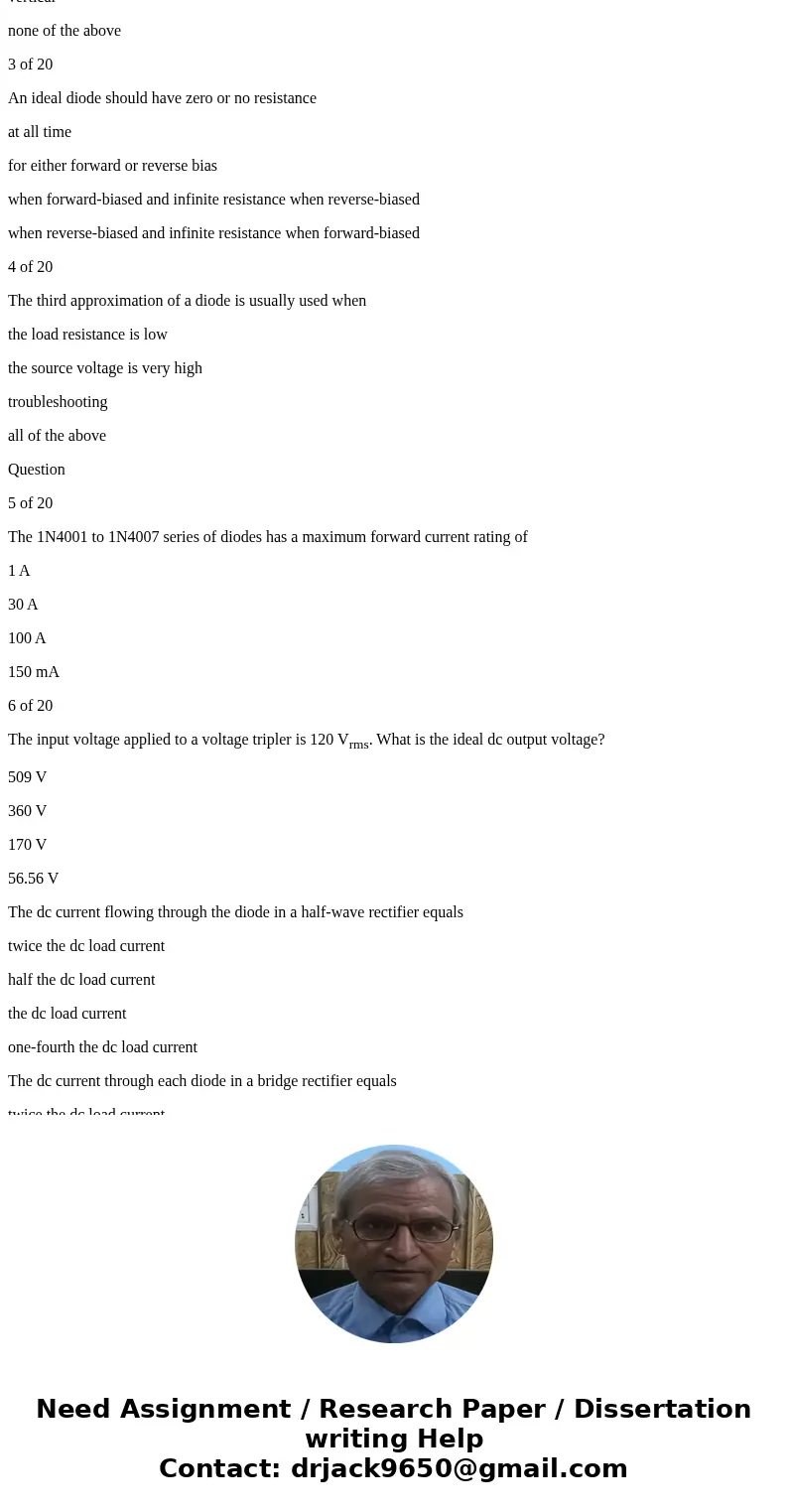
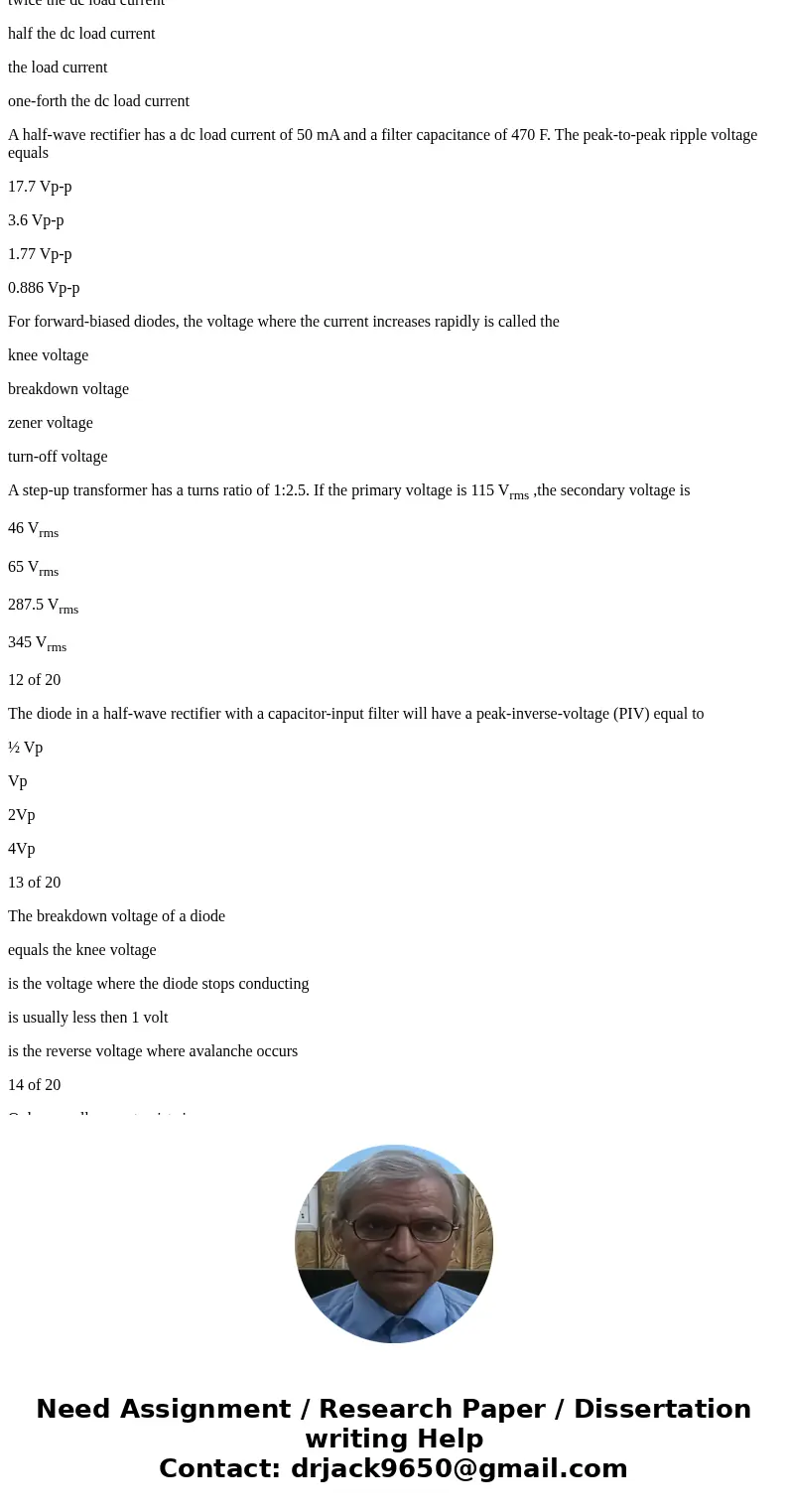
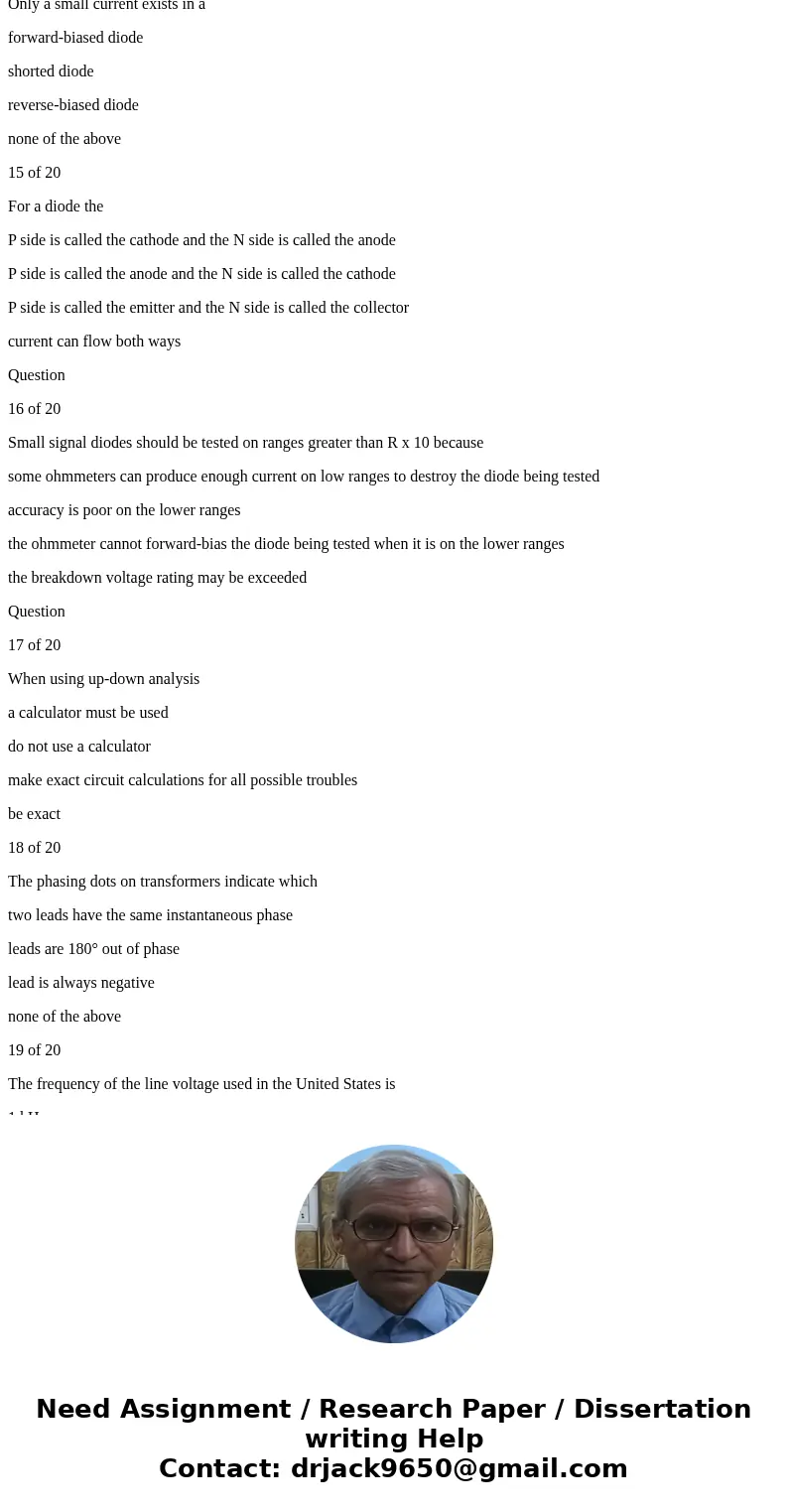
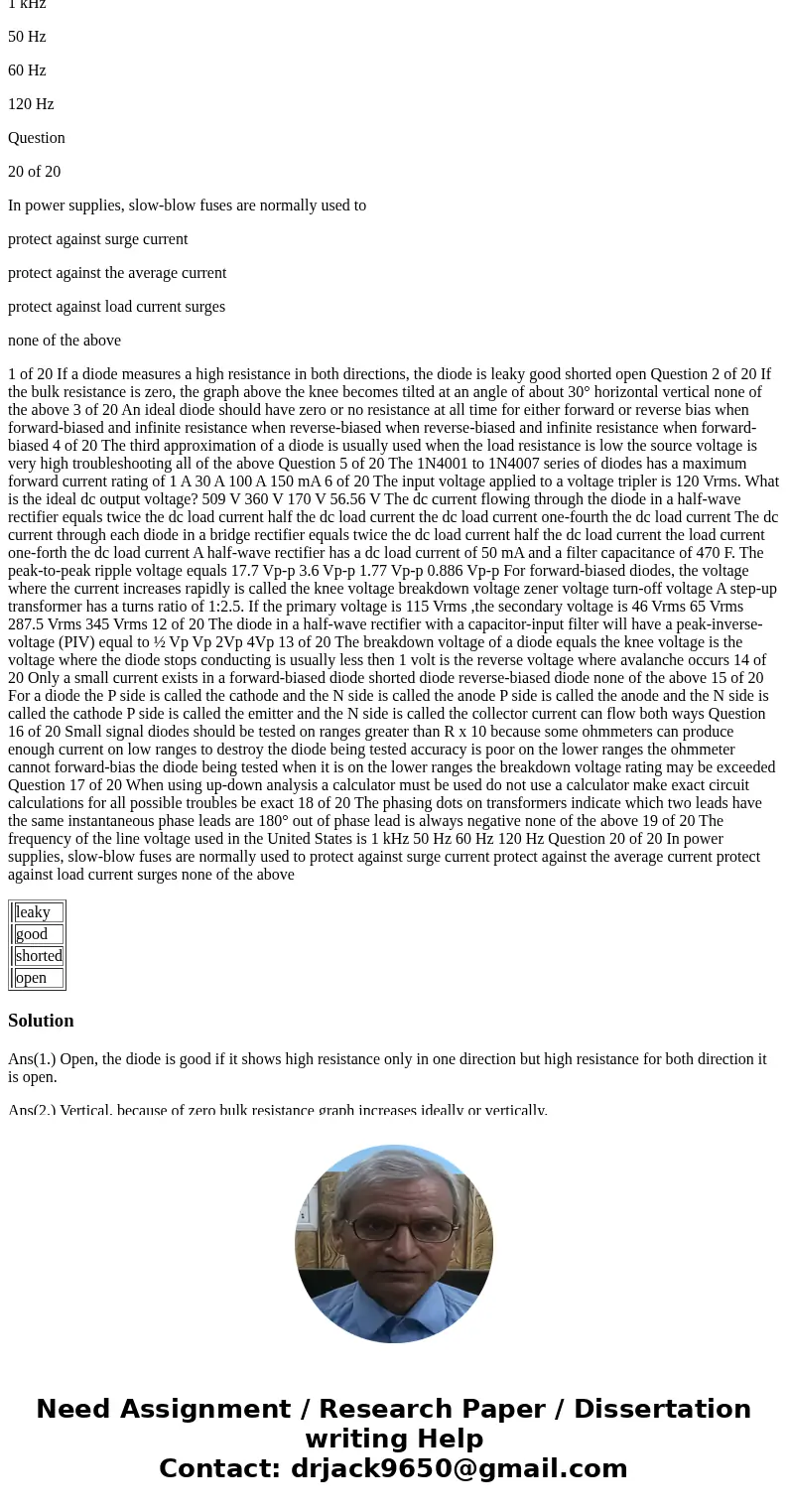
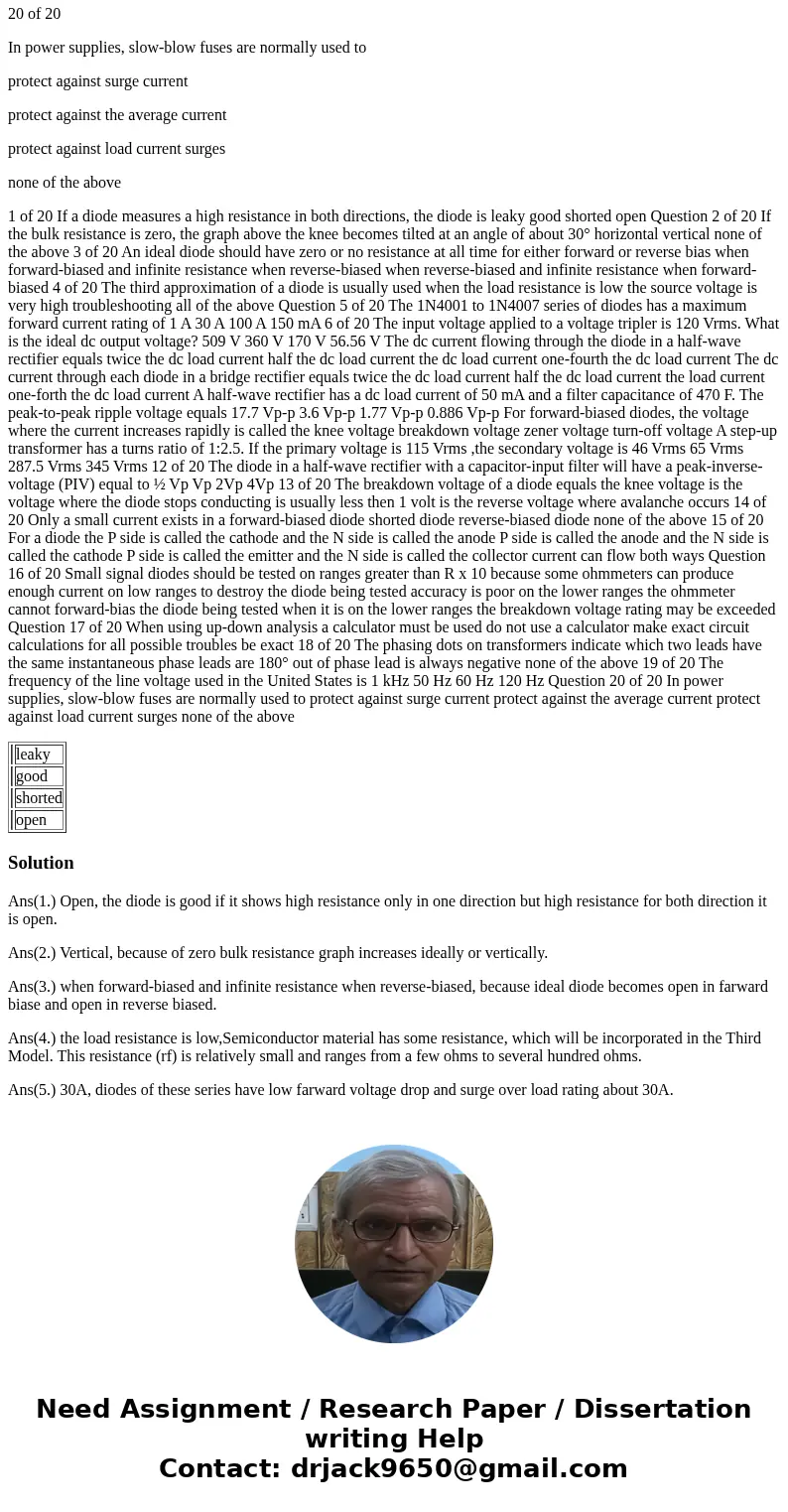
 Homework Sourse
Homework Sourse